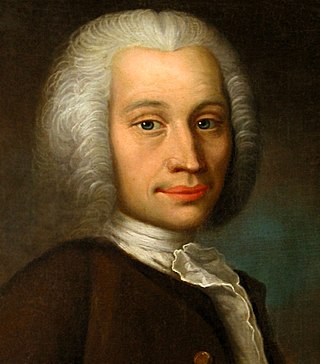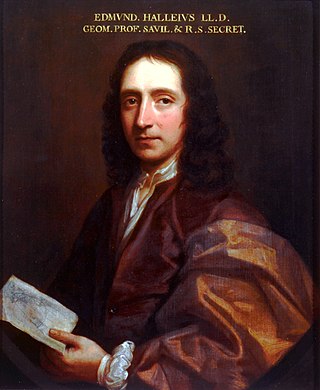Related Research Articles

Anders Celsius was a Swedish astronomer, physicist and mathematician. He was professor of astronomy at Uppsala University from 1730 to 1744, but traveled from 1732 to 1735 visiting notable observatories in Germany, Italy and France. He founded the Uppsala Astronomical Observatory in 1741, and in 1742 proposed the Centigrade temperature scale which was later renamed Celsius in his honour.

1742 (MDCCXLII) was a common year starting on Monday of the Gregorian calendar and a common year starting on Friday of the Julian calendar, the 1742nd year of the Common Era (CE) and Anno Domini (AD) designations, the 742nd year of the 2nd millennium, the 42nd year of the 18th century, and the 3rd year of the 1740s decade. As of the start of 1742, the Gregorian calendar was 11 days ahead of the Julian calendar, which remained in localized use until 1923.
The year 1819 in science and technology involved some significant events, listed below.
The year 1751 in science and technology involved some significant events.

The year 1791 in science and technology involved some significant events.
The year 1744 in science and technology involved some significant events.
The year 1749 in science and technology involved some significant events.
The year 1746 in science and technology involved some significant events.
The year 1743 in science and technology involved some significant events.
The year 1789 in science and technology involved some significant events.
The year 1786 in science and technology involved some significant events.
The year 1764 in science and technology involved some significant events.
The year 1761 in science and technology involved some significant events, listed below.
The year 1758 in science and technology involved some significant events.
The year 1741 in science and technology involved some significant events.
The year 1740 in science and technology involved some significant events.
The year 1736 in science and technology involved some significant events.
The year 1710 in science and technology involved some significant events.
The year 1701 in science and technology involved some significant events.

EdmondHalley was an English astronomer, mathematician and physicist. He was the second Astronomer Royal in Britain, succeeding John Flamsteed in 1720.
References
- ↑ Crilly, Tony (2007). 50 Mathematical Ideas you really need to know. London: Quercus. p. 37. ISBN 978-1-84724-008-8.
- ↑ Celsius, Anders (1742). "Observationer om twänne beständiga grader på en thermometer" (Observations about two stable degrees on a thermometer). Kungliga Svenska Vetenskapsakademiens Handlingar (Proceedings of the Royal Swedish Academy of Sciences) 3:171-180 and .
- ↑ Jervis-Smith, Frederick John (1911). . In Chisholm, Hugh (ed.). Encyclopædia Britannica . Vol. 6 (11th ed.). Cambridge University Press. p. 302.
- ↑ Routh, Edward John (1905). The Elementary Part of A Treatise on the Dynamics of a System of Rigid Bodies. London: Macmillan.
- ↑ Ferguson, Niall (2011). Civilization: The West and the Rest. London: Allen Lane. ISBN 978-1-84614-273-4.
- ↑ Museum of the History of Science, Oxford, inventory 98721 (exhibit label noted 2012).
- ↑ "Copley Medal | British scientific award". Encyclopedia Britannica. Retrieved 21 July 2020.